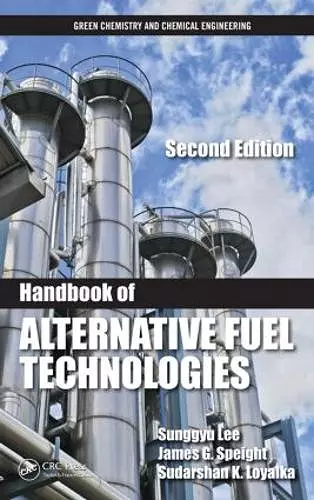Handbook of Alternative Fuel Technologies
James G Speight editor Sunggyu Lee editor Sudarshan K Loyalka editor
Format:Hardback
Publisher:Taylor & Francis Inc
Published:8th Jul '14
Currently unavailable, and unfortunately no date known when it will be back
This hardback is available in another edition too:
- Paperback£65.99(9781138374850)

While strides are being made in the research and development of environmentally acceptable and more sustainable alternative fuels—including efforts to reduce emissions of air pollutants associated with combustion processes from electric power generation and vehicular transportation—fossil fuel resources are limited and may soon be on the verge of depletion in the near future.
Measuring the correlation between quality of life, energy consumption, and the efficient utilization of energy, the Handbook of Alternative Fuel Technologies, Second Edition thoroughly examines the science and technology of alternative fuels and their processing technologies. It focuses specifically on environmental, technoeconomic, and socioeconomic issues associated with the use of alternative energy sources, such as sustainability, applicable technologies, modes of utilization, and impacts on society.
Written with research and development scientists and engineers in mind, the material in this handbook provides a detailed description and an assessment of available and feasible technologies, environmental health and safety issues, governmental regulations, and issues and agendas for R&D. It also includes alternative energy networks for production, distribution, and consumption.
What’s New in This Edition:
- Contains several new chapters of emerging interest and updates various chapters throughout
- Includes coverage of coal gasification and liquefaction, hydrogen technology and safety, shale fuel by hydraulic fracturing, ethanol from lignocellulosics, biodiesel, algae fuels, and energy from waste products
- Covers statistics, current concerns, and future trends
A single-volume complete reference, the Handbook of Alternative Fuel Technologies, Second Edition contains relevant information on chemistry, technology, and novel approaches, as well as scientific foundations for further enhancements and breakthroughs. In addition to its purposes as a handbook for practicing scientists and engineers, it can also be used as a textbook or as a reference book on fuel science and engineering, energy and environment, chemical process design, and energy and environmental policy.
"…This updated edition (1st ed., 2007) begins with a global review of energy consumption and production. …The book discusses coal gasification; liquid fuel from coal, natural gas, and oil sand; coal slurry fuel; shale gas; and shale oil. Fuel from biomass is another focus. The discussion ranges from corn and lignocellulosic ethanol to biodiesel, algae fuel, and thermochemical conversion of biomass. The inclusion of these topics along with the latest developments in each area is very timely because they are becoming of more interest to both researchers and energy industry professionals. Summing Up: Highly recommended. Upper-division undergraduates and above."
—J. Tavakoli, Lafayette College for CHOICE, February 2015 Vol. 52 No. 6
To read the entire reviews, go to http://choiceconnect.org/webclipping/186851/yqnulg14ektaaf67g7c079kp278w8vzu_aclh4clbvmb2g98b-
"The main strength of the material is the comprehensive coverage of all potentially viable sources of alternative fuels and the assessment of the current state of the process technology for transforming these sources into viable alternative fuels. …In my opinion this book is a must for any serious researcher in the field of ethanol production and/or any educator who teaches a course on alternative fuels and ethanol production."
—David G. Retzloff, University of Missouri
"The second updated edition of Handbook of Alternative Fuel Techniques joins others in the 'Green Chemistry and Chemical Engineering' series and will appeal to college-level students of alternative energy who want an engineering guide specific to the science of alternative fuels and their processing. It is directed not just to students but professional scientists and engineers, and provides coverages and comparisons of available technologies, the latest research, and new regulations, safety issues, development trends, and emerging alternative technologies. From chemistry to breakthroughs on the horizon, the Handbook of Alternative Fuel Techniques is a 'must' for any advanced and serious reference collection strong in chemical engineering and alternative energy sources."
—Midwest Book Review, March 2016
"…This updated edition (1st ed., 2007) begins with a global review of energy consumption and production. …The book discusses coal gasification; liquid fuel from coal, natural gas, and oil sand; coal slurry fuel; shale gas; and shale oil. Fuel from biomass is another focus. The discussion ranges from corn and lignocellulosic ethanol to biodiesel, algae fuel, and thermochemical conversion of biomass. The inclusion of these topics along with the latest developments in each area is very timely because they are becoming of more interest to both researchers and energy industry professionals. Summing Up: Highly recommended. Upper-division undergraduates and above."
—J. Tavakoli, Lafayette College for CHOICE, February 2015 Vol. 52 No. 6
To read the entire reviews, go to http://choiceconnect.org/webclipping/186851/yqnulg14ektaaf67g7c079kp278w8vzu_aclh4clbvmb2g98b-
"The main strength of the material is the comprehensive coverage of all potentially viable sources of alternative fuels and the assessment of the current state of the process technology for transforming these sources into viable alternative fuels. …In my opinion this book is a must for any serious researcher in the field of ethanol production and/or any educator who teaches a course on alternative fuels and ethanol production."
—David G. Retzloff, University of Missouri
"The second updated edition of Handbook of Alternative Fuel Techniques joins others in the 'Green Chemistry and Chemical Engineering' series and will appeal to college-level students of alternative energy who want an engineering guide specific to the science of alternative fuels and their processing. It is directed not just to students but professional scientists and engineers, and provides coverages and comparisons of available technologies, the latest research, and new regulations, safety issues, development trends, and emerging alternative technologies. From chemistry to breakthroughs on the horizon, the Handbook of Alternative Fuel Techniques is a 'must' for any advanced and serious reference collection strong in chemical engineering and alternative energy sources."
—Midwest Book Review, March 2016
ISBN: 9781466594562
Dimensions: unknown
Weight: 1088g
702 pages
2nd edition